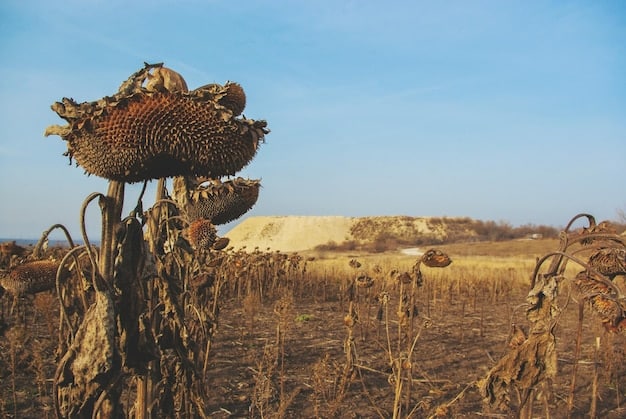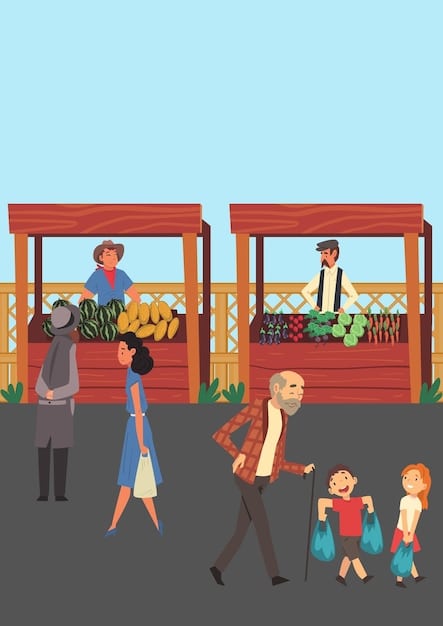Climate Change Impact: Agriculture Faces 15% Crop Yield Reduction by 2030

A new analysis projects a potential 15% reduction in global crop yields by 2030 due to the escalating impact of climate change on agriculture, highlighting the urgent need for adaptive strategies and sustainable farming practices.
The agricultural sector is facing an unprecedented challenge as climate change intensifies. A new analysis projects a significant 15% reduction in global crop yields by 2030, posing a threat to food security and economic stability. Understanding the factors driving this decline and implementing proactive measures are crucial for mitigating the impact of climate change on agriculture.
Understanding the Climate-Agriculture Nexus
Climate change presents a multifaceted challenge to agriculture. Rising temperatures, altered precipitation patterns, and increased frequency of extreme weather events are disrupting traditional farming practices and impacting crop productivity. Understanding these complex interactions is essential for developing effective adaptation strategies.
The Impact of Rising Temperatures
One of the most direct effects of climate change on agriculture is the increase in average temperatures. Higher temperatures can accelerate crop development, shortening the growing season and reducing yield potential. Additionally, extreme heat events can cause heat stress in plants, leading to reduced photosynthesis and decreased fruit set.
Changes in Precipitation Patterns
Altered precipitation patterns, including increased droughts and floods, pose significant risks to agricultural production. Droughts can limit water availability for irrigation, leading to crop failures, while excessive rainfall can cause soil erosion and waterlogging, damaging crops and reducing yields.

To mitigate the impact of climate change, various adaptation and mitigation strategies can be adopted, including implementing water-efficient irrigation techniques, promoting drought-resistant crop varieties, and adopting conservation agriculture practices.
- Implementing water-efficient irrigation techniques such as drip irrigation.
- Promoting drought-resistant crop varieties through breeding programs.
- Adopting conservation agriculture practices like no-till farming.
In conclusion, the climate-agriculture nexus is a complex and pressing issue that requires immediate attention. By recognizing the multifaceted impacts of climate change on agriculture and implementing proactive adaptation and mitigation strategies, we can strive to ensure food security and promote sustainable agricultural practices for the future.
Projected Crop Yield Reductions: A Closer Look
The projected 15% reduction in global crop yields by 2030 is a stark warning of the potential consequences of unchecked climate change. This projection is based on comprehensive analyses that consider a range of factors, including temperature increases, changes in precipitation patterns, and the impact of extreme weather events. Examining these projections in detail is crucial for understanding the scope of the challenge and informing policy decisions.
Regional Variations in Crop Yield Reductions
The impact of climate change on crop yields will vary significantly across different regions. Some regions, particularly those already experiencing water scarcity or extreme heat, are expected to face more severe reductions in crop yields than others. Understanding these regional variations is crucial for tailoring adaptation strategies to specific local contexts.
Impact on Staple Crops
The projected crop yield reductions are expected to affect a wide range of staple crops, including wheat, rice, corn, and soybeans. These crops form the foundation of global food systems, and reductions in their yields could have far-reaching consequences for food security and nutrition.
Addressing the projected crop yield reductions requires a multifaceted approach, including investing in research and development of climate-resilient crop varieties, promoting sustainable farming practices, and implementing policies that support adaptation to climate change.
- Investing in research and development of climate-resilient crop varieties.
- Promoting sustainable farming practices that enhance soil health and water conservation.
- Implementing policies that support adaptation to climate change.
Ultimately, the projected crop yield reductions serve as a call to action, underscoring the urgent need to address climate change and build more resilient agricultural systems. By taking proactive measures, we can work to mitigate the impact of climate change on agriculture and ensure food security for future generations.
The Economic Implications of Reduced Crop Yields
The anticipated 15% dip in worldwide harvests by 2030 isn’t just an agricultural issue; it’s an economic one. Reduced outputs impact pricing, trade dynamics, and the livelihoods of farmers, forming ripple effects that touch diverse sectors.
Price Volatility and Consumer Costs
When crop yields decline, supplies dwindle, and prices tend to surge. This volatility affects consumers directly, particularly in regions reliant on imported foods or where agriculture forms a substantial part of household spending.
Trade Imbalances and Export Challenges
Nations heavily dependent on agricultural exports could face significant revenue drops as yields shrink. This might lead to trade imbalances, strain international relationships, and pressure governments to adopt protectionist measures, further disrupting global markets.

Addressing these economic challenges demands a combined approach, including support for farmers adopting climate-resilient practices, promoting diversification within agricultural economies, and formulating policies to stabilize food prices and markets.
- Supporting farmers through incentives and training to adopt climate-resilient practices.
- Promoting diversification within agricultural economies to reduce reliance on single crops.
- Formulating policies to stabilize food prices and markets during periods of scarcity.
In the end, understanding the economic consequences of reduced crop yields is crucial for shaping informed policies and initiatives that can safeguard livelihoods, foster economic stability, and ensure sustainable agricultural development in the face of climate change.
Strategies for Building Climate-Resilient Agriculture
Facing the projected decline in agricultural yields requires proactive steps to bolster the sector’s resilience against climate change. This entails adopting farming methods that withstand harsh conditions, investing in research, and leveraging technological advancements.
Conservation Agriculture and Soil Health
Practices such as no-till farming, crop rotation, and cover cropping improve soil structure, retain moisture, and reduce erosion. These techniques fortify crops against droughts and floods, enhancing productivity while minimizing environmental impact.
Precision Farming and Technology
Employing technologies like remote sensing, GPS, and data analytics allows farmers to optimize resource use, detect stress in crops early, and tailor inputs to specific needs. Precision farming boosts efficiency and reduces waste, improving yields even under challenging conditions.
Achieving climate-resilient agriculture also requires supportive policies, investment in rural infrastructure, and access to information and training for farmers. These measures collectively empower agricultural communities to adapt and thrive amid climate uncertainty.
- Implementing supportive policies that incentivize climate-smart agricultural practices.
- Investing in rural infrastructure to improve access to markets and resources.
- Providing access to information and training for farmers to adopt new technologies effectively.
In summary, building climate-resilient agriculture hinges on adopting sustainable practices, leveraging technology, and creating an enabling environment for farmers. By embracing these strategies, we can enhance food security and ensure the long-term viability of the agricultural sector in a changing climate.
The Role of Policy and Innovation in Addressing Climate Risks
Addressing the impacts of climate change on agriculture requires a concerted effort involving governments, researchers, and the private sector. Policy interventions and technological innovations are crucial for driving the transition towards climate-resilient agricultural systems.
Policy Support for Sustainable Agriculture
Governments can play a key role in promoting sustainable agriculture by implementing policies that incentivize climate-smart practices, provide financial support to farmers, and promote research and development. Carbon pricing mechanisms, subsidies for conservation agriculture, and regulations on water use can all contribute to building more resilient agricultural systems.
Investing in Agricultural Research and Development
Innovation is essential for developing climate-resilient crop varieties, improving water management practices, and creating new technologies for monitoring and managing agricultural systems. Investing in agricultural research and development can lead to breakthroughs that enhance productivity and reduce the environmental footprint of agriculture.
Collaboration between policymakers, researchers, and the private sector is essential for fostering innovation and ensuring that new technologies are accessible to farmers. Public-private partnerships can accelerate the development and deployment of climate-smart agricultural solutions.
- Fostering collaboration between policymakers, researchers, and the private sector.
- Promoting public-private partnerships to accelerate the development and deployment of climate-smart agricultural solutions.
- Ensuring that new technologies are accessible to farmers through extension services and training programs.
By leveraging the power of policy and innovation, we can create a more resilient and sustainable agricultural sector that is capable of meeting the challenges of climate change and ensuring food security for future generations.
Consumer Choices and Sustainable Agriculture
While systemic changes in agriculture are essential, individual consumers wield significant influence in driving sustainable practices. By consciously altering consumption patterns, supporting eco-friendly products, and advocating for ethical agriculture, consumers can accelerate the transition towards a more resilient and environmentally sound food system.
Embracing Plant-Based Diets
Reducing the consumption of meat and dairy products can substantially lower agriculture’s carbon footprint. Plant-based diets generally require fewer resources to produce and generate less greenhouse gas emissions.
Supporting Local and Organic Agriculture
Choosing locally sourced and organically grown foods diminishes transportation emissions and supports farming methods that prioritize soil health, biodiversity, and reduced pesticide use.
In addition to making informed purchasing decisions, consumers can engage in advocacy to promote sustainable agriculture. Supporting policies that incentivize eco-friendly farming, demanding transparency in food labeling, and engaging in community initiatives can collectively shape a more sustainable food landscape.
- Supporting policies that incentivize eco-friendly farming practices.
- Demanding transparency in food labeling to make informed purchasing decisions.
- Engaging in community initiatives such as farmers markets and community gardens.
In essence, consumer choices have the potential to reshape agriculture towards a more sustainable and climate-resilient model. By embracing conscious consumption, supporting ethical products, and advocating for policy changes, consumers can play a pivotal role in creating a food system that benefits both people and the planet.
| Key Point | Brief Description |
|---|---|
| 🌱 Crop Yield Reduction | Projected 15% decrease in crop production by 2030 due to climate change. |
| 🌡️ Climate Impact | Rising temperatures and altered precipitation patterns affect agriculture. |
| 💡 Resilience Strategies | Adopting sustainable practices and investing in research are crucial. |
| 💸 Economic Effects | Reduced yields can lead to price increases and trade imbalances. |
FAQ
▼
A new analysis projects a potential 15% reduction in global crop yields by 2030 due to the escalating effects of climate change on the agriculture.
▼
The main impacts include rising temperatures, altered precipitation, and increased frequency of extreme weather, like droughts and floods, impacting crop productivity.
▼
Conservation agriculture, precision farming, and investment in research and technology are effective strategies to fortify crops and boost yields.
▼
Consumers can influence sustainable agriculture by embracing plant-based diets, supporting local and organic farms, and advocating for policy changes.
▼
Policy support includes incentivizing climate-smart practices, providing financial aid to farmers, and promoting agricultural research to foster resilient agricultural systems.
Conclusion
In conclusion, the projected 15% reduction in global crop yields by 2030 due to climate change underscores the urgent need for action. By implementing sustainable agricultural practices, investing in research and innovation, and adopting supportive policies, we can build more resilient agricultural systems and ensure food security for future generations. Consumer choices also play a crucial role in driving the transition towards a more sustainable and environmentally sound food system.





